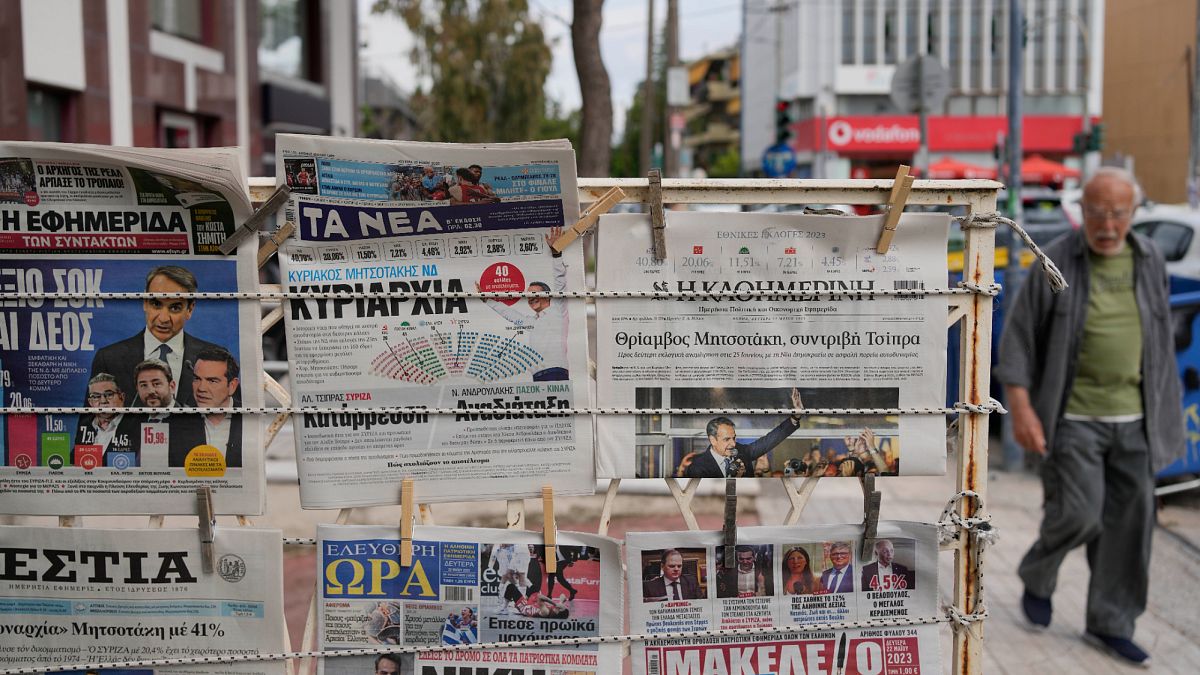A new report published by Human Rights Watch (HRW) provided a poignant assessment of the freedom and difficulties of the press facing Greek journalists.
Report. “From bad to evil: worsening freedom of Greek media” is based on personal testimony and document “general and intentional limitations on Greek journalism” that create an environment where critical reporting is suppressed and self-censorship becomes the norm.”
He also said, “Journalists face state surveillance, harassment and threats by government abuse and abusive lawsuits by politicians that threaten democracy and the rule of law.”
International NGOs recommend that the European Union monitor the situation in Greece, make progress towards freedom of the press and support democratic values.
This is the second negative report of Greece and the rule of law in days and days.
The Borderless Borderless Report (RSF) report, released on May 2, caused a government counterattack to spark a heated political debate within the country.
“The only truth about freedom of the press in all EU countries is reflected annually in the European Commission’s annual rule of law report, which includes a special section on freedom of the media and press,” said Pavlos Marinakis, a spokesman for the government.
Based on personal testimony
Greece is facing a media freedom crisis as a result of actions and omissions by the Greek government that threaten democracy and the rule of law,” HRW said.
Their research is based on interviews with 26 journalists working in a variety of media, along with academics, lawyers and media experts.
HRW interviewed journalists working in print, electronic media, television and radio for public, private, independent media, foreign correspondents and freelancers.
Reports and other documents were also analyzed and contacted at the relevant institutions.
Twenty-two journalists described an increasingly hostile work environment, with six reporting specific cases of high-level government employee harassment associated with reporting.
“There were few journalists who were willing to report,” the research author said.
An independent foreign correspondent said, “Now I’m thinking about leaving this country. I’m really. I’m not seeing the point of being exposed to this level of stress. The story is important, but the level of violence seems to have worsened.”
A journalist with over 25 years of experience on major private television channels in Greece, “What you say on TV is so controlled that you can’t be free. Control is done by someone at a high place… everything is controlled. What you say, how you say.”
Lack of color
The color used to describe the situation in Greece is dark. Greek media landscapes are characterized by a small number of powerful individuals who have a high concentration of ownership and dominate many institutions. Many of them have ties to the ruling party.
The report documents the hostile environment of independent media and journalists, including claims of self-censorship and freeze-up lawsuits and freeze-up media freedoms by the New Democrat government in July 2019, including allegations of harassment, threats, surveillance and abusive lawsuits.
Human Rights Watch also discovered the use of state funds “which will affect the coverage and editorial impacts in public media and further exacerbate this climate,” emphasising that these conditions undermine freedom of expression and public rights to information.
Predatory properties have specific references. “In 2022, the government faced strong suspicions that it would use Predator spy software, which targets journalists, among other things, to create a major surveillance scandal,” the report said.
In the investigation, seven journalists said there was evidence or strong suspicion of government surveillance, either through more traditional means such as eavesdropping, or by targeting commercial spy software.
“This risks causing serious privacy and freedom of expression concerns and stalling reports, as both sources and journalists fear their safety,” he said.
Among the anonymous testimony is that of Stavros Malichoudis, a freelance journalist who discovered in 2021 that the Greek intelligence agency was spying on him.
“For months, I was afraid. It took me a long time to leave what happened and start reporting again, fearing people, my sources and exposing them,” he said.
Human Rights Watch also found that the government had an undue influence on state media such as ERT and the Athens-Methedonia news agency (AMNA), weakening their independence. The government also used state advertising funds to support the government’s media.
Another major concern is the use of legal systems for journalists. Particularly through abusive litigation, often known as Slapps (strategic litigation against public participation).
“The vindicient defamatory lawsuit filed by Grigolis Demetriades, the nephew of the Greek Prime Minister and former senior government official, is an example of this trend against senior government officials against journalists who reported on the eavesdropping scandal,” the report said.
He added, “While recent amendments have decriminalized “simple defamation” (spreading facts, even if true, if it may be offensive), the law still poses criminal liability for “inhumation” and “defense.”
Human Rights Watch has also discovered patterns of attempts by the government and other authorities to undermine accountability. This includes not wanting to disclose details about national security calls to prevent disclosure of information related to the surveillance scandal, whistleblower investigations, and distribution of public advertising funds to the media.
Communication with the government
Human Rights Watch shared the findings of the investigation with government, relevant authorities and media, and their responses are summarized in the report.
“The government has identified several initiatives aimed at improving media freedom, but it is not clear whether these actions will lead to meaningful changes. The government’s overall response is primarily defending and underestimating the seriousness of the documented issues that the human rights clock has documented.”
The report also states that Prime Minister Kiliakos Mitotakis rejected a resolution in the European Parliament, saying that the country’s rule of law is “stronger than ever” and that “Greece in recent years is often the focus of slander.”
“The Greek government’s dismissal response to the legitimate criticism of the European Parliament suggests that stronger action is needed from the European Commission,” says Hugh Williamson, director of Europe and Central Asia.
“In particular, the Commission and the EU need to closely monitor the situation and ensure that true progress is carried out in the freedom of the Greek media and that basic democratic values are respected,” he concluded.








